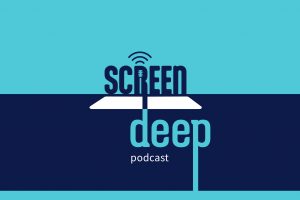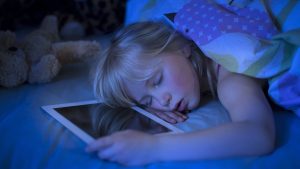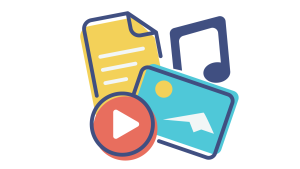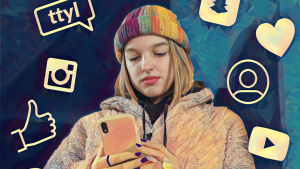Sleep is an essential part of life, and the quality and quantity of a person’s nightly sleep has wide-ranging impacts on cognition, behavior, and health. On this episode of Screen Deep, host Kris Perry discusses children and teens’ sleep and its relationship to digital media with Dr. Lauren Hale, Professor of Family, Population, and Preventative Medicine at Stony Brook University and Founding Editor in Chief of the Sleep Health Journal.
Dr. Hale provides an overview of research into the impacts of digital media on teens’ sleep, including insights from a 2024 scientific consensus panel that evaluated how different aspects of digital device use influence sleep. She also discusses the societal implications of teens’ poor sleep health, and the policy changes that could improve them.
We’ve been nominated for a Webby!
 We are thrilled to share that Screen Deep has been selected as a nominee for the 29th Annual Webby Awards in the Science and Education (Podcasts) category. The prestigious nomination places us in the running for both the Webby award, determined by the International Academy of Digital Arts and Sciences, and the Webby People’s Voice Award for Science and Education (Podcasts), which is decided by YOU, the public.
We are thrilled to share that Screen Deep has been selected as a nominee for the 29th Annual Webby Awards in the Science and Education (Podcasts) category. The prestigious nomination places us in the running for both the Webby award, determined by the International Academy of Digital Arts and Sciences, and the Webby People’s Voice Award for Science and Education (Podcasts), which is decided by YOU, the public.
We need your support to win! Voting is open until April 17th at 11:59PM PST. Simply choose Screen Deep by Children and Screens to show your support.
Listen on Platforms
About Lauren Hale
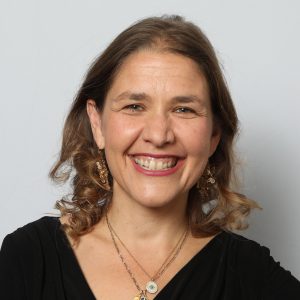 Lauren Hale, PhD is a Professor of Family, Population, and Preventive Medicine, Program in Public Health, at Stony Brook University’s Renaissance School of Medicine. She studies the social patterning of sleep health and how it contributes to inequalities in health and well-being with current or previous funding from NICHD, NIDDK, NHLBI, NIA, and the Della Pietra Family Foundation. Dr. Hale is interested in sleep health equity, policies related to sleep health (i.e. high school start time, daylight saving time), and behavioral modifications (i.e. reducing evening screen use, increasing physical activity) for improving sleep health at the individual and population level. Dr. Hale has over 175 peer-reviewed journal articles. Dr. Hale recently served on the National Sleep Foundation’s Board of Directors (including as Chair and Vice Chair) and is the founding Editor-in-Chief of the journal Sleep Health. She also serves on the Scientific Advisory Panel of the Pajama Program and Children and Screens: Institute of Digital Media and Child Development.
Lauren Hale, PhD is a Professor of Family, Population, and Preventive Medicine, Program in Public Health, at Stony Brook University’s Renaissance School of Medicine. She studies the social patterning of sleep health and how it contributes to inequalities in health and well-being with current or previous funding from NICHD, NIDDK, NHLBI, NIA, and the Della Pietra Family Foundation. Dr. Hale is interested in sleep health equity, policies related to sleep health (i.e. high school start time, daylight saving time), and behavioral modifications (i.e. reducing evening screen use, increasing physical activity) for improving sleep health at the individual and population level. Dr. Hale has over 175 peer-reviewed journal articles. Dr. Hale recently served on the National Sleep Foundation’s Board of Directors (including as Chair and Vice Chair) and is the founding Editor-in-Chief of the journal Sleep Health. She also serves on the Scientific Advisory Panel of the Pajama Program and Children and Screens: Institute of Digital Media and Child Development.
In this episode, you’ll learn:
- Why sleep is important for cognitive and overall health – and why sleep regularity may be as important as duration.
- Which populations are getting less sleep and possible consequences.
- What the latest research tells us about technology use and sleep – delayed sleep, sleep duration, impaired sleep quality, digital sleep interruption, and blue light.
- What types of screen use and media content are associated with poorer sleep quality for youth.
- Why abolishing Daylight Savings Time and changing school start times may positively impact youth sleep health.
[Kris Perry]: Hello and welcome to the Screen Deep podcast where we go on deep dives with experts in the field to decode young brains and behavior in a digital world. I’m Kris Perry, Executive Director of Children and Screens and the host of Screen Deep. Today I’m thrilled to be joined by Dr. Lauren Hale, Professor of Family, Population, and Preventive Medicine at Stony Brook and the founding Editor in Chief of Sleep Health Journal among many other accomplishments, and I’m proud to say is also a member of Children and Screen’s National Scientific Advisory Board. Lauren is a major leader in the field of sleep health, both in general and how it relates to technology use, and I’m looking forward to hearing her insights today. Welcome, Lauren.
[Dr. Lauren Hale]: Hi Kris, good to see you again.
[Kris Perry]: Hi. So, first question – and I’m asking this of all the guests of the podcast – how much time do you spend on screens a day, and do you think it’s too much?
[Lauren Hale]: Yes, it’s too much, and I don’t really believe my iPhone numbers on what it says I spend online because I also think some of those activities are productive activities, like listening to a book or talking to my friends or family. So, yes, I spend too much, and too many to report on this podcast, but I do try to reduce screen use in bed, I’ll say that. Related to my topic today on sleep.
[Kris Perry]: Okay, well, exactly. Maybe that’s the perfect segue. Because as I know, and our listeners are going to find out, you are one of the foremost experts on sleep and health research. And what we want to get right to is how and why did you get into this field? What drove you to study sleep health?
[Lauren Hale]: That is a great question, and I want to start by saying I am a researcher of population sleep health, and there are many, many incredible sleep scientists, and my take on sleep is looking at sleep as a public health issue. So I have a slightly different angle than the majority of other sleep researchers, but what I’ve learned is that the sleep community is very welcoming and they like my angle, I like the work they do, so we fit together. So your question was, how did I get here? And it’s been over 20 years, so I’m sure the story shifted a little bit, but there is an origin story. I started my PhD studies in demography, which is a social science, the study of fertility, mortality, and migration – nothing has to do with sleep in that world – and I was studying disparities in health. And I was interested in why some people have longer life expectancy than others. And in that world, I was exposed to an annual symposium at the University of Wisconsin that I attended regularly. And one April day, I think it might even have been my birthday in 2002, I was attending a lecture by a Harvard scientist, Bob Stickgold, and he was talking about the importance of sleep for learning, not just in how a full night of restorative sleep improves next day’s capacity for learning, but how sleep after you learn consolidates memories. So, you know, really the importance of sleep for everyday cognition. And I was fascinated by that research, extremely out of my wheelhouse. And then he ended his lecture and I was in a room full of psychologists, and he just said, “You know, we don’t know anything about the demography of sleep.” And I was like, “Oh my god, that’s what I’m gonna do”. So then I became, you one of the first self-identified demographers of sleep and I, you know, ran up to him in the airport the next day – thankfully it’s a very tiny airport – and I was like, “I’m gonna do that”. And sure enough that’s what I’ve been doing ever since for two decades. So, you know, primarily my research on sleep is looking at how sleep varies across the population, by subgroups, and the way social and contextual factors influence sleep. It wasn’t until about five or 10 years into that research, more like 10 years, when smartphones became ubiquitous, that I was like, “Oh, one of the major contextual factors that matters for sleep is technology.” So that’s how I got to where I am with regard to technology. But I have a kind of a bigger and broader perspective as well.
[Kris Perry]: Got it.
We’ll get to the screen interactions in a minute, but I want to follow up on something you talked about a minute ago when you talked about how important sleep is when it comes to cognition. And I’d like you to talk a little bit more about exactly what does sleep do, or how is it important for cognition and other aspects of functioning and health, which might lead you to talk a little bit about why humans need sleep.
[Dr. Lauren Hale]: By the way, it’s not just humans that need sleep. It’s humans and every other living creature needs sleep. And why we need it, evolutionarily, is kind of outside of this conversation, but I’ll just say some of the known benefits of sleep, of course, as I just mentioned, include cognition. Not only does it improve readiness to learn, it actually, it helps with the consolidation of memories and the learning itself. It also affects things like impulsivity and responsiveness, you know, to external stimuli. It also has a whole range of psychological impacts – not just mood, but also depressive symptoms, anxiety symptoms – and it also has an impact on every other organ in the human body. So whether it’s obesity or immune function, we see a huge range of benefits to sufficient restorative sleep. And that’s why I argue, as I have done many times, that sleep is a fundamental human need, and the fact that some subgroups of the population are not sleeping the optimal duration is a social justice issue and that’s where I am. And when it comes to kids and teens, we know that screens are one of the barriers to getting the sleep they need. So I want to help facilitate better habits so that we can get everybody to functioning optimally or at least better than they would otherwise if they had those screens in their bed all night long.
[Kris Perry]: Yeah, well, I can’t wait to talk more about sleep, but I want to dig into this one other point you’re making about children, childhood. Is it, is it more important for children to get sleep? And if so, are there stages or ages within childhood that are even more important than other stages of childhood?
[Dr. Lauren Hale]: For sleep, absolutely, I mean sleep is important at all stages of the life course. I’ll just say younger humans need more sleep and generally have earlier sleep than older children and adults. So just by sheer fact that kids might need ten hours of sleep compared to seven that an average adult might need means that every minute that’s taken away from not getting that sleep is more of a potential loss for them. And also we expect and know that brains are growing pretty rapidly during childhood, so that – that affects the importance of sleep too. But I don’t want to downplay how important sleep and adulthood is either because we know the benefits of sleep for adult populations as well.
[Kris Perry]: Absolutely, absolutely. Are children and teenagers getting enough sleep?
[Dr. Lauren Hale]: What do you think? Okay, so as much as – as many times as I’ve answered this question, I’ll just say it’s not a precise science on what the correct amount of sleep is. The consensus panels, which I have not been on, but I know the people on the panel, recommend that teenagers get between eight and ten hours of sleep per night and somewhere between fifty and seventy percent of teenagers are not getting a minimum of eight hours. Some sleep scientists argue that teenagers should really be getting nine and a half hours or nine and a quarter hours of sleep per night, and ninety percent of teens are not getting that. And some were between fifty and ninety percent of teens are not getting the sleep they need. That’s a problem. For younger children, usually there’s more sleep, which is good, but there might be different types of sleep problems. And you know, it’s not as bad, but it’s still not great because as we already mentioned there’s a lot of important things going on in children and we care about their brains and how they act the next day and routines such as regular sleeping and eating habits are good for them and good for families. Just ask any parent who can’t get their child to sleep at night, it’s pretty frustrating.
[Kris Perry]: Right, I mean you’re laying out a pretty strong case for how integral sleep is to our overall health, mental health, physical health. No matter what age we are, but this deeper dive we’re taking into children and their unique, that unique stage of development and the unique role sleep plays in that point in development is of so much interest to me that I, you know, and you mentioned different demographic groups and where it may be more challenging for some groups to get enough sleep and that may present possibly a social justice issue. Can you talk a little bit about those differences in sleep health and which populations are struggling with, you know, adequate sleep?
[Dr. Lauren Hale]: Sure. So this is where I started. I started looking at adult populations of sleep and I hypothesized that there would be disparities by race, ethnicity, as well as by education group. And pretty much as expected, we found that lower levels of education were associated with both very short sleep and very long sleep, which is actually a risk factor for mortality. What’s going on there is unemployment, by the way. And similarly, we found black/white differences in sleep of pretty large magnitude. It’s been replicated in numerous studies since. Some studies show over an hour difference in night between black male sleep and white male sleep. And that’s per night. If you add that up, those are really large decrements in sleep with pretty big impacts on health because we know there are consequences for metabolic function and other things. So I started that work, as I said, over 20 years ago. And then I moved into kids around the same time that I moved into screens as well. And sure enough, starting in, you know, I haven’t done the infancy work, but starting in infancy, and I’ve done work on toddlers, school-aged kids, teenagers, we see again, black/white differences, around twenty to thirty minutes of objective sleep, less per night for black kids than white kids. And as I said, that’s pretty substantial. And sometimes we see that it’s compensated during the day by either sleeping after school or taking more naps during the day, but I wonder what’s going on in the homes. Whether it’s related to, you know, minorities tend to be disproportionately shift workers, so there may be fewer parents in the home who may be able to enforce or maintain bedtime routines. Often we see that urban living, living in either densely populated areas or in dense housing may impede or delay bedtimes. So, you know, there are multiple factors going on and I never want to blame any parents for working shift work or multiple jobs, but we do see these differences. And what I’m concerned about is the lasting consequence of persistent either delayed or late sleep onset, shorter sleep duration, because we see that it has consequences for later life outcomes, including inadequate or insufficient sleep routines in ages five and nine predict higher obesity at age fifteen. We’ve shown that in our data, regardless of age fifteen sleep. So we think there are consequences that matter for sleep health and a range of other outcomes, and that’s what I’ve been trying to work on and figure out ways that we can kind of change the way that populations sleep so everyone is getting more of the good stuff.
[Kris Perry]: Yeah, so you’ve been at this for 20 years. If I were to step back and look at the last 50 years or 100 years, is there data regarding the way that sleep patterns may have stayed the same or changed? Just, what’s the, quickly, the history of sleep? Have we – have humans changed their sleep patterns over, you know, generations or has it gone relatively unchanged?
[Dr. Lauren Hale]: It is common knowledge or common lore, I think, to say, you know, we’ve been sleeping less and less, we’re a sleep deprived society. I think that’s a little bit overstated. For the most part, population levels of sleep have not changed that much, maybe a little bit. In teens, though, Jean Twenge did a study saying that since kind of the ubiquity of the smartphone in 2012, we’ve seen an increase in teenagers not getting enough sleep and it’s associated with smartphone use. That’s an association. It’s hard to say it’s a causal effect. Lots of other things are happening in society at the same time so it’s hard to know. But I do think there’s at least an important role for technology as an explanation because at least at the individual level, we know that it’s a modifiable behavior. We can intervene on that. With some of the more structural questions like, you know, why is education associated with sleep? It’s harder to intervene there and fix the, you know, fix the problem. And here we say, well, we do see in experimental studies that when you take the smartphone away from the kid in their bedroom, they sleep more. So there’s something we can do about it. That’s not to say taking a smartphone away from a teen-aged girl is easy. It’s not.
[Kris Perry]: No, yeah, but what is really helpful about this conversation is lifting up the importance of sleep. It’s something I think like respiration or heart rate. We might just take for granted that it’s so automatic, it’s so baked into us as humans that we of course will sleep, of course we’ll breathe, of course our heart will beat, you know, of course, of course. But in fact, sleep has, it has a more complex, we have a more complex relationship with sleep and have more control over it than some of these other functions that I just described. And you mentioned some of the important research you’ve done that looked systematically and reviewed consensus studies and the topic of sleep and media use. And it would be really helpful, I think, again, for that big picture view of those findings and reviews and studies to give us a sense as broadly as possible, what should we all know? What have you learned about sleep and our relationship to it?
[Dr. Lauren Hale]: Sure. So, I think it was like 2014 was when I first started my big study on age fifteen, a national sample of age fifteen year olds. And I was like, I need to understand what we know about screens and sleep. And at that point, there was only one or two other systematic reviews out there. So I did a very thorough dive of the literature at that time, and that was around the same time I got involved with the Children and Screens Institute. And at that point, I can assure you, there are only sixty-seven articles out there, only sixty-seven. Ten years later, we just completed a consensus panel. There are hundreds and hundreds of articles, you know, like five to ten times that number. So one conclusion we can make is: there’s been a massive growth in interest on the topic of digital media use and sleep. So that’s the first conclusion. But in 2014 or 2015 when that article came out, the evidence I would say was overwhelmingly cross-sectional, overwhelmingly self-reported, and overwhelmingly consistent. Over ninety percent, probably more, ninety percent of the articles showed more screen use was associated with delayed bedtime, shorter sleep duration, and impaired sleep quality if they measured it. And it was just like, okay, this is what’s out there all around the world, all ages, it was zero to seventeen, but that’s what I found. There were a couple other people who had done papers on this, but not that many, and we had at that point only three proposed mechanisms. I’m gonna share them now because they’re important. The first is, of course, time displacement. The time that you’re on your screen is time that you are not falling asleep or preparing for sleep or being asleep. You know, it’s interfering with sleep. It’s, you’re doing something other than sleeping, and when I said a kid needs 10 hours of sleep, they can’t be on their phone for that many hours. I don’t want to give a number of hours, but any time, any additional ten minutes of screen time is ten minutes less they’re not sleeping at a minimum because it may also then delay sleep. So time displacement is extremely important. The second mechanism in those early articles was about the stimulation, the psychological stimulation, the content of what you’re doing kept you up. And of course, there’s a huge range of types of psychological stimulation. It could be emotional, it could be violent. You could argue that a kids app is not very stimulating, but a teenager on social media is extremely stimulating. Chatting with a boyfriend or a potential boyfriend is, you know, distressing, you know, there’s all of these different types of interactive to less interactive that could be emotionally stimulating, that could delay sleep, cause rumination, cause anxiety, those sorts of things. So that’s the second mechanism — displacement and then psychological stimulation. And the third mechanism, which I think in the beginning years, until relatively recently, got a lot of press because it was the most physiological, and was the idea that the bright light emitted from the screens suppresses the sleep-promoting hormone melatonin, and therefore would delay sleep onset. And there is evidence for that. I’ll say in a few minutes how the perspective on that has shifted. But that systematic review, along with several others that were done around that time, were pretty consistent. The evidence supports this association. These are the proposed mechanisms, what you gonna do about it? Put the screens away, throw in some blue blocker glasses. That was sort of like what we were told to do for a while. More on blue blocker glasses later. So as I mentioned, a lot more research has come out since then, including more experimental research, and another great paper came out yesterday. There’s good stuff coming out all the time. But in the spring, or really last year, I chaired a consensus panel for the National Sleep Foundation where we had sixteen experts, internationally recognized experts on mostly sleep and media, but some were more media than others, but mostly people had experience in sleep too. And our team did another systematic review, as I said, over five hundred articles included that met our criteria and we did expand it to adults as well. And I’ll just point out the highlights. One is there’s a new mechanism that’s emerged not just this year, but more recently. And that is disruptions during the middle of the night. Common Sense Media in I think it was the 2019 wave survey showed that like over thirty-five percent of kids report waking up to check their phone in the middle of the night. Whether it’s beeping or bleeping or buzzing or vibrating, or maybe just knowing that it’s in the room makes you want to check it. You don’t want to miss anything – It’s the FOMO experience, having the potential that your friends are having a conversation without you or about you makes you want to get up and check your phone, just in case. So that mechanism, I think, has now kind of risen to the fore a little bit more, say, you got to really be careful about what’s happening while you’re sleeping and not let the phone interfere with you while you’re sleeping. So that’s the fourth mechanism. And then I’d say the other thing that sort of happened is there’s been a pushback from some people, but it’s based on a number of studies saying the actual effects of the blue light are a little overstated. There is an effect of blue light on melatonin, but maybe the other effects might be the more pressing ones. So in other words, don’t put on the blue blocker glasses, that’s not enough. You come back to my original claim is: get your phone out of the bedroom, you should not be using phones while you’re trying to fall asleep. So as a result of the consensus panel, we voted on, I guess, ten statements. I’m not gonna go through all of them now because that’d be super boring. But the bottom line is for kids and adolescents, the consensus panel agreed that in general, digital media impairs sleep health and that content is probably what’s driving it, you know, compared to possibly blue light. But we just didn’t reach consensus on the light question, we just said content is important. And that’s a message for everyone, kids or adults, that you should be paying attention to what sorts of things keep you up at night. Don’t do those things. Whether it’s screen time or something else, if that activity is like interfering with this fundamental need for sleep, don’t do that at that time. There might be another time, you know, just going to pull out of my head: If doing your taxes makes it hard for you to sleep, don’t do your taxes at 11:30 at night. It’s the same thing with, don’t chat with a group of six friends at 11:30 at night if you want to prioritize your sleep.
[Kris Perry] You mentioned some changes in the understanding of blue light and how to cope with it for sleep. Is there broad agreement in the field? And conversely, are there areas of spirited disagreement in terms of the impacts of media use on sleep?
[Dr. Lauren Hale] I think despite some, you know, a recent article in which I wrote a commentary or I co-authored a commentary, there’s a little pushback – In my mind, we’re more aligned than not aligned. I think there is relatively broad agreement on the role of screens in the bedroom or rather on the adverse role of screens in the bedroom. I think there’s broad agreement on that. I think there are excellent scientists who, appropriately, want to pick apart the mechanisms and understand what’s going on, how it’s going on, and maybe look at bidirectionality. There are a lot of questions to ask, but I think we generally agree that we should not be bringing our smartphones in the bedroom to optimize sleep. So I think there’s generally agreement. The blue light question is maybe more sensitive to the people who are really committed to that. But I think there is still broad agreement on the roles of screens in the bedroom, which is: they shouldn’t be there.
[Kris Perry] Yeah, and you know, I mean, we’ve talked about systematic reviews and consensus and consensus studies and this is like really taking a broad view of this topic. But has there ever been, or is there one finding or one study in this field that you found most personally surprising?
[Dr. Lauren Hale] Well, one of the areas that I think people like to talk about is interactivity versus passive screen watching. And I used the example earlier of a teenage girl ruminating over, you know, maybe she wasn’t included in a bowling trip or whatever. I think the evidence is pretty clear that more interactive screen use, such as social media, maybe video games where you’re chatting with other people, is likely, or you know, the evidence supports that that’s more disruptive to sleep onset than, say, passive screen watching, which people in my generation, for us, watching TV in bed with remote control – remember those things? – might be a little bit less disruptive. So I think that’s one of the, kind of, more, I don’t know if it’s surprising, but it’s more nuanced. And one of our studies among 22-year-olds, we showed, in fact, that the within-person, on nights when they use social media, they go to bed later. On nights when they use passive screen–this is within-person, so we have two weeks of data for them– on nights when they’re just streaming a video, they go to bed earlier. So, you know, there is a little bit of, in that it was not by a huge amount, but it’s like, okay, maybe there’s some support that, you know, compared to what you could be doing, passive screen use is better.
[Kris Perry] It also gives me pause to think about, you know, at the population level, how disruptive the devices and media have been to children’s sleep and how critical sleep is to their overall development. And even at a deeper level, their ability to metabolize information, reorganize it and use it again as they go through their day, their life. And so being educated about the importance of sleep health makes you want to have that too, just like other parts of our health. We focus a lot on fitness, but we should be sort of focusing on sleep fitness, it seems like, as a way to complement other kinds of fitness. In your opinion, are there other factors, any other factors besides media that are keeping youth from achieving sleep health, sleep fitness, especially at the individual level?
[Dr. Lauren Hale] Yeah, you know, teenagers have been sleep deprived for long before the smartphone and long before television. This is a biological phenomenon that as teens enter puberty, they experience a phase delay in their circadian rhythm, which causes them to stay up later. I’m at that stage now where my 13 year old goes to bed after me. I’m in bed, I’m like, “Put yourself to bed. I’m going.” And I hate it because I want to make sure he’s okay and does go to bed, but what you gonna do? So that is just physiological. There’s not much you can do about it. It’s very hard for a teenager to fall asleep earlier at the same time as their younger siblings, for example. So that impedes at the onset. What also happens at the offset, which is to say wake up time, is high schools start way too early. As we know, over 80% of high schools start before 8:30 in the morning. California and Florida now have changed their legislation on that, and we’re waiting for the results to roll out. So, that’s at least working in the right direction in two states. They’re nice big states, but we need to see change around the country. And then we have all sorts of other factors that influence teenagers wanting to fall asleep related to their increased autonomy and control over their lives. Because they have social lives, they have activities they like to do, they have homework, activities they don’t like to do, or maybe they do. Yeah, so all of these things. And if you look at a teenager’s schedule, whether they have after-school jobs or extracurricular activities, they get home at night, they barely have time to eat dinner, they gotta catch up on their phones, their homework, their whatever. When are they gonna have that alone time? And that is, whether it’s on their phone or not, they just don’t have a lot of time. And yeah, that interferes with their sleep. So it’s, what are you gonna sacrifice? Something that feels like an invisible amount of time, which is sleep, because you’re not aware of when you’re sleeping. And yet everybody is aware when they haven’t slept well. So, they should care, and many people do care about their sleep.
[Kris Perry] Is there any conventional wisdom on sleep, in general, that you think people are getting wrong?
[Dr. Lauren Hale] Yeah. I think one of the most interesting, relatively new findings in sleep is that sleep regularity, consistency across the week, not just during the weekdays, is at least as important as sleep duration in terms of physical health. You should be approximating, within an hour or so, the same bedtime and wake time on weekend nights as well as weekday nights. And that’s really hard for teenagers because they’re trying to catch up from their lost sleep, something of a sleep debt, during those early school start time days. So, it’s challenging. But, I don’t know if anybody’s getting it wrong, but it’s just really hard to kind of follow a schedule consistently across the week when people have activities and events that go late into the night on the weekends. And that’s the natural cycle for a teenager to stay up late. So, they want to do that on a weekend night and then sleep in as long as their body will let them. And then they do it again on Saturday night and sleep in on Sunday. And then it’s hard for them to fall asleep Sunday night because they’re not tired come 10 or 11 o ‘clock. So, you know, it’s a challenge.
[Kris Perry] So, that conventional wisdom, really glad you brought up that example of catching up with your sleep. Anytime I hear somebody say they’re going to “catch up on their sleep,” I think, “No, no, no. That ship sailed. You didn’t sleep. You don’t get to go back and sleep from yesterday.” I mean, but maybe I’m wrong. Can you catch up on sleep?
[Dr. Lauren Hale] Well, there was a consensus panel on this. I wasn’t on it, but it did recommend that if you experienced sleep debt, go ahead and get that extra sleep. So you should catch up. It’s not the same as getting it at the time your body should probably have gotten it, or at the time your body usually gets it in the middle of the night. But yes, if you need to catch up, it’s probably advisable and I think especially for teens. Because one thing we forgot to mention earlier when we listed all of the associated harms with insufficient sleep, poor mental health, poor cognition, impaired physical health. There’s also a massive public safety issue, especially when teenagers who are, you know, by design, inexperienced drivers, are behind the wheel of a car and they’re sleep deprived. You know, this is the riskiest time to be on the road, especially if you haven’t slept well. Studies that have delayed school start times find, you know, crash fatalities greatly reduced when kids are going to school later. You change the school start times, fewer car crashes. It’s a public safety issue.
[Kris Perry] That’s an excellent point. Do you think there are other areas that need to be better studied when it comes to sleep health in general and vis -a -vis technology use? You brought up this great example about public safety. Are there other areas we should be studying?
[Dr. Lauren Hale] I’m a researcher, so of course I’m like, “Yes, there are so many.” But I think when it comes down to it, the really – the biggest challenge for the field is how to create change in behaviors in the population. So, I think we more or less know where we want to be, but we don’t know how to get there. I’m thinking of a couple of studies where they tried to recruit teens to put their phones away for the hour before bed. Fewer than 20% of teens would agree to a study like that, even if you pay them. It’s just like people don’t want to put their phones away. And those that are might not be representative of the rest of the population, those are kids who are doing other things at night. So, how can we reach the most vulnerable people, the ones who are most at risk of not getting the most sleep in the first place, and the most at risk of using their phones in a problematic way at night. How can we get them to change their behaviors? And I don’t know if that’s really a research question, but it’s surely a challenge.
[Kris Perry] Well, it’s a public education question or a public health question, which you touched on earlier. And it strikes me that, you know, the minute we go to sleep, we’re not available to be algorithmed. We’re not available to look at ads. We’re not available to spend time on your app. We’re asleep. And so what strikes me about what you’re saying is, especially now that technology is part of the mix, and it’s already challenging for teenagers to sleep just biologically. But then you add in a phone, makes it even more challenging. So what’s interesting when I think about additional study is, you that you’re kind of swimming upstream here because the media, phone manufacturing industries, right, they get a lot out of you being awake and being on your phone. So that attention economy is in full force when you’re awake on your phone and it’s a very irresistible activity. So… One thing I think a lot about when I talk to researchers like you is, you know, access to the data that the platforms gather and that they know about us. In fact, my watch reminds me it’s bedtime. You know, there are some nice features there that are helpful, you know, the amount of data that’s available to them, but maybe not to you and other researchers, would that assist you in better understanding sleep patterns? What it exactly is at a more nuanced level. What are children doing with their phones at night so that you could maybe be more targeted in a public education campaign or a public health campaign that would get at something more specific?
[Dr. Lauren Hale] Right, sure, one of the biggest challenges for researching both sleep and media use is measurement. How do you accurately measure sleep? People don’t self-report their sleep very well. There are live dimensions of sleep, whether it’s, as I mentioned earlier, duration or timing or quality or regularity. You gotta have a lot of data to really get that. So we use devices. We use actigraphy for you to watch that. Phone use, again, people are terrible at reporting their own phone use. I myself said, “iPhone got it wrong. I couldn’t possibly be on the phone that much per day. How could I be who I am and be on the phone that many hours? That’s ridiculous.” But there are ways to track smartphone use. In fact, I think you know I’m doing a study where we’re passively sensing, we’re monitoring how much teens are on their phones. And we’re able to get down to the minute what they’re doing, in terms of which app they’re on, how long they’re on each app. It’s preliminary research so far, but we’ve got some submissions submitted to journals. And we see over five hours of their own personal smartphone use per day, an hour and a half of that during the school day. These are alarming numbers. And we also can see that some of those are associated with – some of that screen use is associated with worse outcomes. Not just sleep, but you know, social media use, for example, is associated with worse sleep and higher obesity than just overall screen time. So, you know, there’s certain types of screen time that are likely worse than other types of screen time. That said, all the data we have are not perfect because, especially iOS data, or imputed data collected through a VPN, so we don’t actually get the exact precise data. It would be great if we could get more and better information on what kids and adults are doing on their phones at any point. Not that we want to read their content or their emails, we just want to see what types of activities are associated with worse outcomes. And that’s one of the challenges for the current batch of researchers. We’re all trying to crack that nut. And then once we have that information, we still need to translate that into change in the population. So it’s still not that easy. But that’s what we’re doing.
[Kris Perry] Well, you’ve really connected so many dots today. Sort of why it’s important in childhood to sleep for then and for later. How it helps with cognition as well as physical health. How in some ways the more privileged you are, the more likely you are to sleep, which advantages you further. And you’ve also talked a little bit about some of the public health, public safety issues associated with folks not getting adequate sleep. Which kind of brings us up to this policy question just for a second. And I can’t get out of my head someone sharing with me, I don’t think it was you, that the golf lobby has been very successful in something related to daylight savings time, which I think everybody here can relate to that day when you lose the hour and how frustrating that day can be or jet lag. Is there an advocacy effort around sleep health, and how many daytime hours there are?
[Dr. Lauren Hale] I’m so glad that you brought up the public policy issue of daylight savings time because it is very relevant for sleep. And, as you know, all the states except for Arizona and Hawaii change their clock schedule for about half the year from standard time to daylight saving time. And in that daylight saving time, there’s more evening hours. So there’s more sunlight in the evening. It’s about the timing of the light. Are you getting more light in the morning or more light in the evening? The circadian and sleep research community is pretty strongly– feels pretty strongly that the evidence supports shifting to permanent standard time, which means getting rid of daylight saving time altogether. And then there’s another side of that where some people say, ooh, the switching of clocks is a problem, but wouldn’t it be better if we just had all the light at night rather than light in the morning? And I think the evidence supports getting light in the morning better than getting light at night, but there are other people who like the idea of more light at night. So that’s the conflict. And I know it’s a little complicated. I don’t think it’s an issue that Congress will be voting on soon, but states do have the ability to abolish daylight saving time. But this is an important and kind of surprising sleep issue that I think is on the horizon as a policy issue, I think. But not immediate. It’s not the most pressing issue of the day.
[Kris Perry] But it is, what I love about this example for adults that are listening, is it gives you a glimpse into what it feels like to have sleep deprivation or to be a teenager and not be getting adequate sleep. That one hour a few times a year causes a fair amount of fogginess and grogginess and –
[Dr. Lauren Hale] More than that, that one hour causes an increase not only in car, it’s the one hour loss happens in the spring. In the fall you actually get a 25-hour day. The leap forward in the spring causes an increase in heart disease as well as car crashes. And that’s just from a one-time blip. And so the counter argument is, well that’s just the adjustment period, that’s why it causes that. The counter argument is that no, there’s the cumulative effect of always getting the later bedtime, always missing that morning light because there are benefits to getting light early in the morning.
[Kris Perry] Thank you so much, Lauren. One last question. Based on all your experience and research, if there’s just one or maybe two things you could tell someone concerned about their child or adolescent sleep that you think would make a difference in making their children more healthy, what would it be?
[Dr. Lauren Hale] The easiest thing to say here is make and enforce a policy to keep screens out of the bedroom. That’s the easiest thing to do. The second level request, which is not as easy to do, is model it yourself.
[Kris Perry] Back to our original question about how much time you’re on your phone or I’m on my phone. I think that role modeling point is outstanding. Thank you, Lauren, for sharing your expertise on all things sleep with us today. I’m sure our listeners have learned a lot. Speaking of which, thanks to the listeners who made it this far with us today. For more information and resources about parenting, child development, and healthy digital use, head over to our website, childrenandscreens.org and check out our Learn and Explore Resource Library for the latest research and advice on critical topics facing children and families in the digital age. Have a topic or expert in the field that you’d like to hear from? Drop us a comment or reach out on social media. Don’t forget to stay tuned for upcoming webinars, cutting edge research, and new resources as they come out. Until next time, keep exploring and learning with us.

